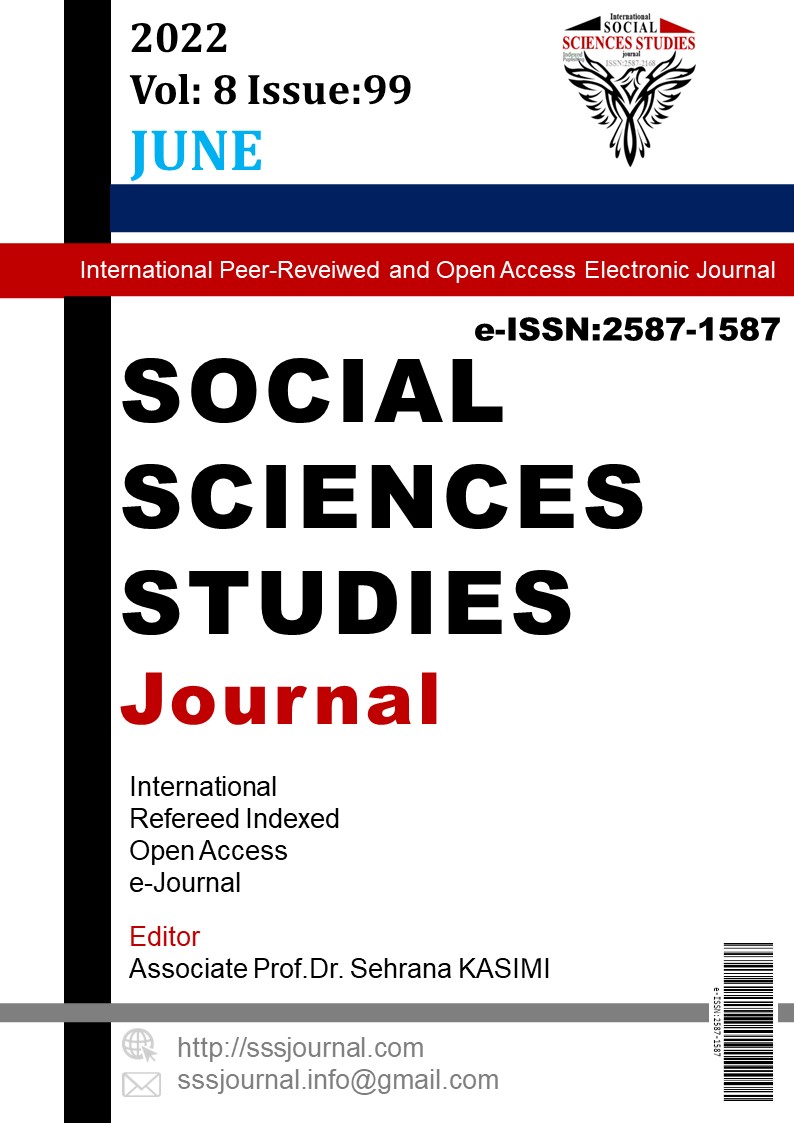Author :
Abstract
Çalışmanın amacı bu yapılan dil hatalarının tam olarak ne olduğunu tespit edip düzeltilmesi için neler yapılabileceği konusunda çözüm önerileri sunmaktır. Dil becerisini geliştiren birey kendini o dilde daha iyi ifade edebileceği için, karşı tarafa da tam olarak ne anlatmak istediğini iletebilecektir. Almanya'da yaşayan 3. ve 4. kuşak Türk soylu öğrencilerin çoğu Türkçe konuşmada sorun yaşamaktalar ve Türkçe konuşurken Almanca-Türkçe karışımı bir dil kullanmaktadırlar. Bu durum Türk soylu çocuklar ve aileler için önemli bir sorundur. Nitel araştırma kapsamında gözlem yoluyla veriler elde edilmiştir. Almanya’nın Kuzey-Ren-Westfalya eyaletine bağlı, dokuz şehirden oluşan Ennepe-Ruhr bölgesinin 5 farklı okulda seçmeli olarak Türkçe dersi olan 154 çift dilli öğrencinin ders esnasında Türkçe konuşma becerileri gözlemlenmiş ve yaptıkları konuşma hataları gramer kategorilerine göre sınıflandırılmıştır. Elde edilen veriler içerik ve betimsel analiz ile değerlendirilmiş ve yorumlanmıştır. Bu öğrencilerin kendilerini Türkçede olarak doğru ifade edemedikleri tespit edilmiş, karma bir dil kullandıkları gözlemlenmiş ve Almanca bilmeyen bireylerle iletişim sorunları yaşadıkları tespit edilmiştir. Bu öğrencilerin konuşma hatalarının düzeltilmesi için hem Türkçe öğretmenleri derslerde konuşma becerisine ağırlık vermeli ve hem de veliler ile iş birliği içerisinde bu sorunun çözümü için çaba sarf etmelidirler.
Keywords
Abstract
The aim of the study is to determine exactly what these language mistakes are and to offer solutions on what can be done to correct them. Since the individual who develops his/her language skills can express himself/herself better in that language, he/she will be able to convey exactly what he/she wants to convey to the other party. Most of the 3rd and 4th generation Turkish ancestry students living in Germany have problems in speaking Turkish and they use a mixture of German and Turkish while speaking Turkish. This is an important problem for children and families of Turkish descent. Within the scope of qualitative research, data were obtained through observation. The Turkish speaking skills of 154 bilingual students who took Turkish lessons in 5 different schools in the Ennepe-Ruhr region, which consists of nine cities in the North-Rhine-Westphalia state of Germany, were observed during the lesson and their speech errors were classified according to grammatical categories. The obtained data were evaluated and interpreted with content and descriptive analysis. It was determined that these students could not express themselves correctly in Turkish, it was observed that they used a mixed language, and it was determined that they had communication problems with individuals who did not speak German. In order to correct the speaking mistakes of these students, Turkish teachers should focus on speaking skills in the lessons and make an effort to solve this problem in cooperation with the parents.
Keywords
- Akkaya, C. (2021). Almanya'da Okutulan "Kolay Gelsin!" Adlı Yabancı Dil Olarak Türkçe Öğretimi Ders Kitabı
- Akkaya, C. (2021). Almanya'da Okutulan "Kolay Gelsin!" Adlı Yabancı Dil Olarak Türkçe Öğretimi Ders Kitabı Setinin İncelenmesi. (Hacettepe Üniversitesi Açık Erişim Sistemi).
- Bekar, B. ve Öztürk, A. (2018). Avrupa’da Türkçe Derslerinin Dil Edinimine Katkısı (Almanya’da III. Kuşaklar Üzerine Bir İnceleme). ODÜ Sosyal Bilimler Araştırmaları Dergisi (ODÜSOBİAD), 8(1), 17-27.
- Küçükkıratlı, H. (2019). Almanya'da Türk göçmen çocuklarında dil durumu ve dil edinim/öğrenim sorunlarıüzerine son on yılda yapılan çalışmalar (Yüksek Lisans Tezi, Necmettin Erbakan Üniversitesi Eğitim Bilimleri Enstitüsü).
- Özbal, Bayram (2021). Almanya’da Türk Çocuklarına Türkçe Öğretimi: “Ne Haber?” Öğretim Seti Örneği, II.Uluslararası Türkçenin Yabancı Dil Olarak Öğretimi Sempozyumu, Istanbul: İstanbul Aydın Üniversitesi Yayınları.
- Yıldırım, A. ve Şimşek, H. (2008). Sosyal bilimlerde nitel araştırma yöntemleri. Ankara: Seçkin Yayınları.
- Yılmaz, M. Y. (2014). İki Dillilik Olgusu ve Almanya'daki Türklerin İki Dilli Eğitim Sorunu, Electronic Turkish Studies, 9(3), 1641-1651.





